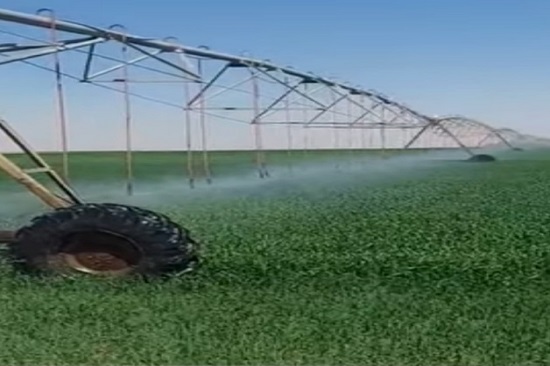| News Details |
Water crisis in Iraq
2023-06-17

Instructor Dr. Sinan Latif Mahmoud Ministry of Education - Anbar Directorate of Education
Water constitutes the second pillar of the triad of life - air, water and food, and no living organism can do without it at all, and above all, it is the pillar of economic life, which agriculture and industry represent its two main pillars, and the importance of water is not limited to economic life only, but that importance is at the heart of domestic services and what family kitchen and human hygiene require from washing and bathing.
The Holy Quran has linked between the importance of water and the sustainability of life dialectically inextricable, has referred verse (30) of Surat Al-Anbiya to this fact by saying: [And we made of water every living thing do not believe], as water represented the first basis for the establishment of the first human civilizations, including the civilization of Mesopotamia nearly seven thousand years ago and this applies to other civilizations such as Egyptian, Chinese, Indian and civilization Inca and Aztecs all those civilizations would not have arisen without sewers Rivers and abundant water.
With regard to Iraq, the matter is clear and witnessed, if it were not for Mesopotamia - the Tigris and the Euphrates - cities, districs and villages would not have arisen, and rural areas would not have arisen, and Iraq would have turned into a barren land without life, neither man nor animal, but no bird or tree, and if water is of this importance in terms of life - human, plant and animal - you can imagine the extent of the tragic disaster that will befall Iraq if the two rivers do not support millions of Iraq's population.
The system of dividing water quotas between riparian countries on a common river represents a very clear paragraph in the Charter of the United Nations, and an example of the inability of this major global institution is that it did not solve the crisis of dividing the Nile waters between Ethiopia, which represents the upstream site, and Sudan and Egypt together, which represent the shore with the upstream country, and the Arab League was also unable in this international mission, and this is vital and prominent evidence that definitely indicates that Turkey has exploited the country in land and population, and it seems that it has ignored history, the neighbourly bond and the brotherhood of Islam, which has been the northern Muslim neighbor since its existence.
The water problem between Iraq, Syria and Turkey is not a unique or rare case with its peculiarity. One of the main sources and resources of upstream countries as well as downstream countries (water, not oil, will be the dominant issue in the Middle East after 2000), according to the Center for Strategic and Economic Studies in Washington, which has declared more than once that about seventy hotbeds of tension in the world are caused by water, which will be the mother of future crises.
Iraq has passed successive scarce years since 1933, and the worst was the succession of three water years, which are 1999, 2000 and 2001, then repeated in 2009 and 2010, and now it is repeated during this year 2023 at the same rates of water scarcity and even more severe, and we emphasize here, despite the scarcity of fresh water in the world, as well as the nature of the global climate, which has become inclined to high temperatures at clear annual rates and a lack of rainfall and annual fluctuation in areas However, we emphasize here that the water crisis in Iraq has absolutely nothing to do with natural factors, but is mainly subject to very clear human factors, limited to the Turkish position, which offended the neighboring bond on the one hand, and the foreign policy of the Iraqi government only.
Low water levels in the course of the Al-Warrar stream(28/5/2023)
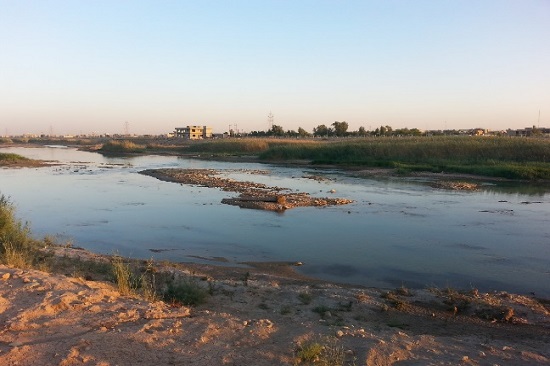
Low water levels in the course of the Euphrates River (Ramadi – Zweya Satih 30/5/2023)
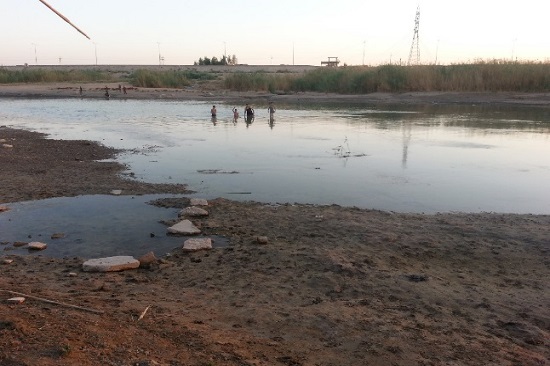
The agricultural and industrial sector in Iraq depends by (70%) on the Tigris and Euphrates rivers to provide water needs, and the needs of the descended constitute (90%) of the water of these two rivers. Therefore, the Documentary Centre for Human Rights in Iraq stated that Iraq has become a semi-desert state, and that the area of the desert has become about half of Iraq's total area despite the presence of the Tigris and Euphrates rivers. And that Iraq has lost up to (70%) of its field crops during the past years due to drought and desertification, especially after the establishment of the GAP project in Turkey, which includes the construction of (21) dams and (17) electric power plants in addition to (3) dams on the Tigris River, the construction of the Ataturk Dam, which diverted a large part of the water to a distance of up to (30) kilometers from the main course to irrigate an area estimated at (350) square kilometers, and this contributed to the decrease in water rates by up to (45%), thus disrupting Iraq (20%) of its agricultural land this year. Because of these Turkish projects, Syria will lose (40%) of its water share, while Iraq's loss will be more devastated and destroyed because it will lose (90%) of its water share The current Minister of Water Resources confirmed that Iraq lost (7) billion cubic meters of its strategic water reserve on 30/5/2023 He also stated that the water releases arriving in Iraq have decreased by (50%) and that the province of Babylon alone has lost (3000) dunums of rice crop for this agricultural season due to water scarcity, and this It is a patriotic duty for every smart mind and free pen to enter this dangerous crisis.
Therefore, the necessities of water have become political and economic almost common with oil in this field and may compete with it in the future, after the depletion of oil, it is likely to constitute the same power as oil now, it may even cause regional and international wars, as this dispute over water has become a warning of the emergence of local and regional conflicts, which requires the region to take this issue seriously through the existence of a vision and a strategic dimension that requires the development of unified water policies to meet the challenges of water security, which was manifested by the saying of one of the Turks (Why do the Arabs want us to give them water for free while they sell us oil?) and raise the slogan of water for oil, and raise another slogan is water is the oil of the future makes the shape of the next wars change from wars Oil and energy to water wars, dams started by Turkey and followed by Syria, and Iraq remained waiting for disaster.
This Turkish position represents a historical crack, and a significant political error, and the next may be worse, something and more subtle, because Iraq is living the beginning of the crisis, whose results have appeared but have not yet worsened, but if that crisis worsens, it means one of two things: either the certain death of more than forty million Iraqis, or the migration of the Iraqi population in search of ways of life, and this is very difficult.
It is logical that Turkey did not only flout international law, but also underestimated the life and economy of the people of Iraq, and the features of underestimation of the Iraqi government and its foreign policy are clear.
Disadvantages of river scarcity in Iraq:
The scarcity of water in the Tigris and Euphrates rivers in Iraq has serious consequences, and results in disadvantages at the ground and human levels, most notably:
1. It threatens the lives of millions of Iraq's population, because it is the pillar of life, and the backbone of domestic services.
2. Heavy losses threaten the Iraqi economy, especially the agricultural sector – both plant and animal – which represents the second pillar of that economy after oil.
3. It exacerbates the problem of desertification and multiplies the scourge of salinity in the land of Iraq.
4. Compounds the problem of unemployment already existing in the country, and this is linked to the collapse of plant agriculture and livestock, cattle, poultry and fish.
5. Kills industrial activity that is already in the dying stages.
6. It leads to hateful migration and leaving the countryside, which would not have been the basis without the waters of Mesopotamia, and this migration results in social, economic and psychological problems that burden cities.
7. The scarcity of water and the migration of the countryside leads to the creation of new problems, most notably the decline of the green carpet, and here lies the opportunity for desertification and climate extremism.
8. Water scarcity in Mesopotamia leads to serious harm to the southern marshes of Iraq, which have been recognized by UNESCO as a world heritage, and destroys a distinct geographical environment in Iraq.
9. The low levels of rivers and the lack of water resources increase the chance of stability of river islands as a result of the lack of river erosion and thus their expansion at the expense of the course itself.
Addressing water scarcity in the Tigris and Euphrates rivers in Iraq:
The problem of scarcity in the Tigris and Euphrates is human origin and has nothing to do with natural factors, but it is of clear political significance, but it will lead to disasters that befall Iraqis that include both land and man, and within the context of scientific research - geographical - we can propose the most prominent methods of treatment, namely:
1- Diplomatic negotiation with the upstream country in accordance with international law, which guarantees the right of international shore on the river shared by two or more countries.
2- Improving the political relationship between Iraq, Turkey and Syria, and this is entrusted to the Government of Iraq within its foreign policy.
3- Building dams as quickly as possible – on the course of the two rivers, and raising the water level to the level of interest and investment, instead of losing fresh water in the jungles of the seas.
4- An agricultural revolution supported by a strict national law with deterrent penalties for those who use tourist irrigation and water waste.
5- The state intervenes as a pioneer and encourager by distributing sprinklers and modern irrigation methods at subsidized prices, and intensifying the agricultural extension process at the level of districts and districts in the governorates.
6- Abolition of fish farming – field ponds – and replace them with floating cages in riverbeds.
7- Leave water storage in lakes, and invest their lands in agriculture using modern irrigation methods.
8- Heading to the investment of groundwater, supporting farmers in drilling wells, and harvesting water in the rainy seasons.
9- The government recycles heavy water and drainage water, similar to the countries of the civilized world.
Traditional methods of cultivation and irrigation
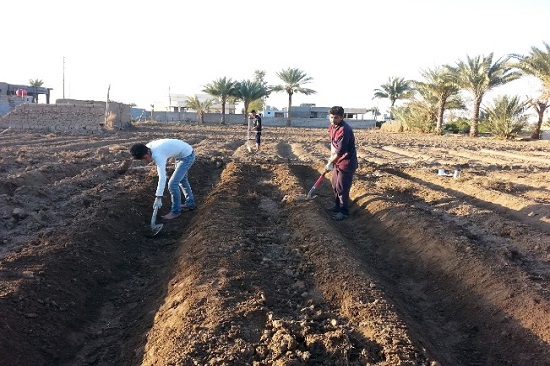
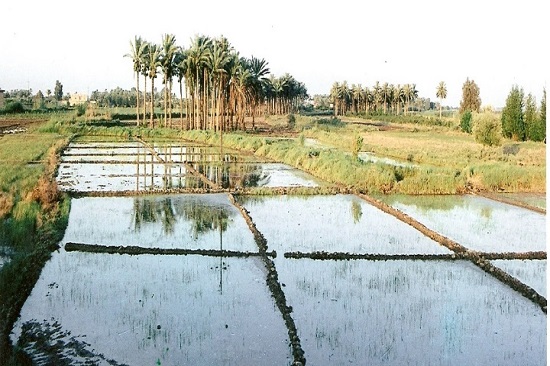
Modern methods of cultivation and irrigation
